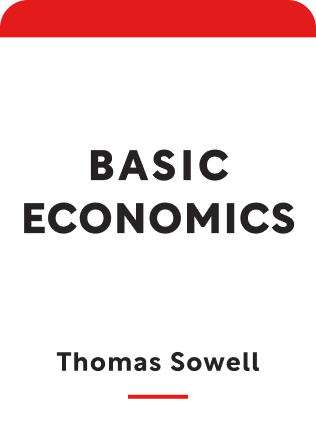

This article is an excerpt from the Shortform book guide to "Basic Economics" by Thomas Sowell. Shortform has the world's best summaries and analyses of books you should be reading.
Like this article? Sign up for a free trial here .
What causes global economic inequality? Do you think it is possible to achieve perfect equality across the world?
The vast differences in wealth between people living in different countries can be emotionally troubling. However, given the vast differences in factors underlying economies (geography, natural resources, culture), as well as the complex interaction of such factors, it is impossible to expect economic equality across the world.
In this article, we’ll take a look at the factors that underpin global economic inequality.
What Causes Economic Inequality?
International inequality in wealth is unavoidable because of the fundamental differences in factors that prop up countries’ economies (e.g. geographic location, natural resources, etc.). Places with inherent advantages had more opportunities to develop urban industrial, commercial, and financial skills than disadvantaged areas. These advantages can kick off virtuous cycles that widen the gap, perpetuating global economic inequality.
Quick note: one study claimed that inequality is rising, because the ratio of the incomes of the top 20 vs lowest 20 nations increased from 23:1 in 1960 to 36:1 in 2000. However, this is misleading because the identity of the nations had changed—when comparing the same 20 countries in 2000, the ratio had declined to 10:1.
Relevant factors that differ between nations include:
Geography
Agriculture
- Land differs in fertility.
- Fertile mollisols are found in the American midwest and Eurasia. They are seldom found in the tropics or sub-Saharan Africa.
- Rainfall, and even different absorption of rainfall
- Loess soil in northern China holds more rain than limestone soils in the Balkans.
- Sunlight
- Lack of agriculture inhibits development of cities, which spur economic growth.
- (Shortform note: the book Guns, Germs, and Steel argues that the vast tracts of land in the same latitude in Western Europe – and thus a consistent climate – facilitated spreading of agricultural practices, compared to the longitudinal orientation of Africa with varying climates)
Natural resources
Water access
- Water transport is far cheaper than land transport. Thus access to waterways increases imports and exports.
- Calmer, flatter, contiguous, more consistent waters like European or Chinese rivers were far more helpful than sub-Saharan rivers that suffer huge plunges in elevation, vary dramatically in depth and width by season, and don’t connect continuously; or Eastern European rivers that flowed inward into inland seas or the Arctic Ocean (rather than outward into the more useful Atlantic) and were more likely to be frozen.
- Even though Africa is twice the size of Europe, it has a shorter coastline due to fewer twists and turns and less surface area.
- It’s cheaper to load large volumes of goods directly onto ships docked near shore, rather than requiring large vessels to anchor offshore and require loading and unloading with smaller vessels.
- Water is also drinkable, used for irrigation, and provides marine food.
Mountains and Isolation
- The slow speed and cost of traveling through mountains means less open trade, exchange of ideas, and economic opportunities. Thus mountainous regions tend to lag behind lowland areas and become insular communities.
- Cultural differences (language, way of life) and skill differences that develop over centuries in mountains areas persist when people move away – for instance, Appalachian people and Scottish highlanders tend to be poorer even in new environments.
- Isolation can occur on islands, deserts, and other geographic barriers.
- The Canary Island natives discovered in the 15th century were in the stone age level.
- Ironically, mountains can provide valuable water to lowland regions.
Animals
- Horses increase transportation range and increase the size of the “cultural universe.”
- Oxen allow for more efficient agriculture and enable more trade by carrying cargo from ships.
Location to other cultures
- Agriculture first started in the Middle East, giving mediterranean Europe earlier access to agricultural practices than northern Europe.
- Koreans and Japanese adapted Chinese writing to develop languages, developing faster than more remote Asian societies.
Cultures
Even with geographic advantages, culture can impede economic growth.
Honesty and abiding by the rule of law increases trust, spurs broader trade outside one’s trusted circle, and promotes less risky investment.
Geographies that give resources aplenty can make humans develop less productive habits.
- A tropical land that produces crops all year creates less urgency with time and self-discipline, compared to colder areas where people must begin plowing as soon as the spring thaw arrives to raise sufficient crop before the winter months to avoid starving.
- Similarly, the need to store food in winter (as well as the ability to store food in colder temperatures, period) can promote a culture of frugality and saving.
- “Living in harmony with nature” can make a culture less resourceful and efficient.
Some cultures seek progress rather than stay contented with the status quo.
- The antebellum South tended to adopt new technology and create patents at lower rates than the North.
Some cultures are more receptive to new ideas from outside; others isolate themselves.
- The Ming Dynasty in 15th century China isolated itself from the outside world, convinced of its clear superiority over barbarian nations, and its desire to focus inward to fight a Mongol threat.
- In the 17th century, Japan became isolationist to ward off foreign threats to political stability, such as encroachment of Spain/Portugal, Christianity, and foreign support of feudal lords (daimyo) who might gain too much power and overthrow the shogunate.
- The Middle East translates 3 orders of magnitude fewer books into Arabic than Spain or Greece.
- Smaller tribal societies find it harder to combine with others to form large nation-states and remain vulnerable to marauders or imperial conquerors.
- In contrast, while Britain and Japan both started off as poor island nations, they were alike in absorbing advances from other cultures.
Some cultures discriminate within its society (by gender, class, caste, religion, race), preventing the best ideas from winning out.
- Limiting the potential of all people can only be limiting and less productive.
Some cultures practice more xenophobia and less meritocracy than others.
- Cited by Thomas Sowell, an Indian spokesman asked, “Are we not entitled to jobs just because we are not as qualified?”
- Xenophobia and clashes can lead to closing off foreigners and outside influences, once again limiting the best ideas from coming through.
Interaction of Factors
Furthermore, these factors interact with each other and depend on timing.
Technology affects the value of natural advantages.
- Heavy soils in Europe became fertile only after harnessing oxen to plow, but these very soils were infertile in earlier centuries.
- Oil in the Middle East became profitable in the 20th century, but primarily because the technology to extract such resources and make them useful made this possible. (Shortform note: Also, global politics had changed – 200 years earlier, it might have been colonized and the resources siphoned to rich countries with little local investment.)
Exposure to specific other cultures and technologies increases the size of the cultural universe.
- In the 17th century, Europeans had centuries of access to knowledge across Asia, the Middle East, and North Africa, using gunpowder, paper, and math. Meanwhile, Native Americans had a much smaller cultural universe, without ways of knowing other people even existed.
Cultures that share a common language tend to share more knowledge with each other.
- Thus British industrialization spread more readily to the United States than to closer countries in Europe speaking different languages.
The movement of peoples can result in displacement of existing culture, assimilation by migrants, or the addition of a new culture.
Poverty tends to be self-reinforcing. Parents have more children since child mortality is higher; children are put to work earlier, depriving them of education and economic opportunity.
Culture tends to persist, even when people leave their host culture.
- Tropical zones tend to be poorer, but immigrants from richer countries have prospered there.
Even more culturally and advanced cultures can be destroyed by more militarily powerful peoples.
- The Roman Empire was destroyed by barbarians, perhaps setting progress back by centuries.
History leads to different population structures, such as growing vs shrinking; young vs old.
Given the large number of factors influencing economic growth, as well as the complex interaction of these factors, as well as mere happenstance, it seems foolish to expect equal economic outcomes throughout the world. Rather, the more productive approach is to understand how the different factors at play can promote economic growth and impede it.
Side note: Some argue that imperialism and slavery hampered the development of certain nations. Thomas Sowell dismisses this, giving a few lines of evidence:
- some empires like the Spanish simply consumed the wealth it gained, rather than investing it in the economy. So the excess wealth wouldn’t have made a large long-term difference
- colonies in modern empires like Britain’s were economically negligible compared to trade with rich nations
- large economic disparities already existed before these conquests

———End of Preview———
Like what you just read? Read the rest of the world's best book summary and analysis of Thomas Sowell's "Basic Economics" at Shortform .
Here's what you'll find in our full Basic Economics summary :
- Why we use money, rather than bartering our services with each other
- Why some nations prosper, while others stay poor despite vast natural resources
- How rent control might actually reduce housing supply and quality






